Exploring RNFA: Scope of Practice, Standards, and Ethics in Toronto
VerifiedAdded on 2023/06/03
|8
|2311
|243
Report
AI Summary
This report delves into the scope of practice, standards, and code of ethics governing Registered Nurse First Assistants (RNFAs) in Toronto. It highlights that the RNFA role is an expanded function of a registered nurse within perioperative nursing, emphasizing the importance of ethical principles, theoretical knowledge, and specialized clinical skills. The report details the five standards governing perioperative nursing practice, with a specific focus on the RNFA's ability to collaborate with physicians during surgical procedures. It also outlines the nine dimensions of RNFA competencies, including professionalism, patient care, supportive care, and resource management. Furthermore, the report emphasizes adherence to the Canadian Nurses Association's code of ethics, which mandates safe, compassionate care, promotion of patient well-being, informed decision-making, and preservation of patient dignity. The document also discusses the regulatory framework in Ontario, including the Nursing Act of 1991 and the Regulated Health Professions Act of 1991, and the potential disciplinary actions for violations of standards and ethics.
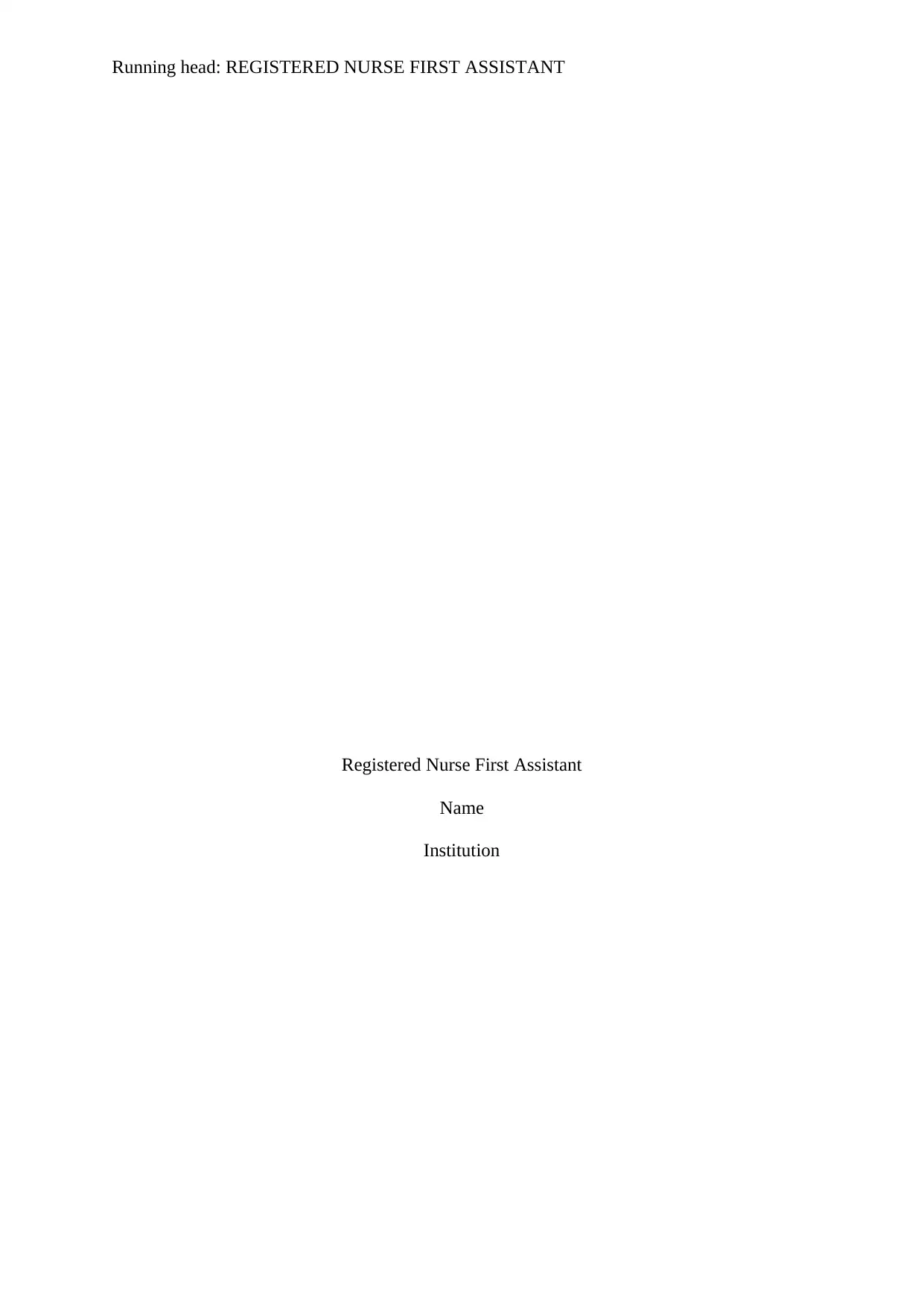
Running head: REGISTERED NURSE FIRST ASSISTANT
Registered Nurse First Assistant
Name
Institution
Registered Nurse First Assistant
Name
Institution
Paraphrase This Document
Need a fresh take? Get an instant paraphrase of this document with our AI Paraphraser
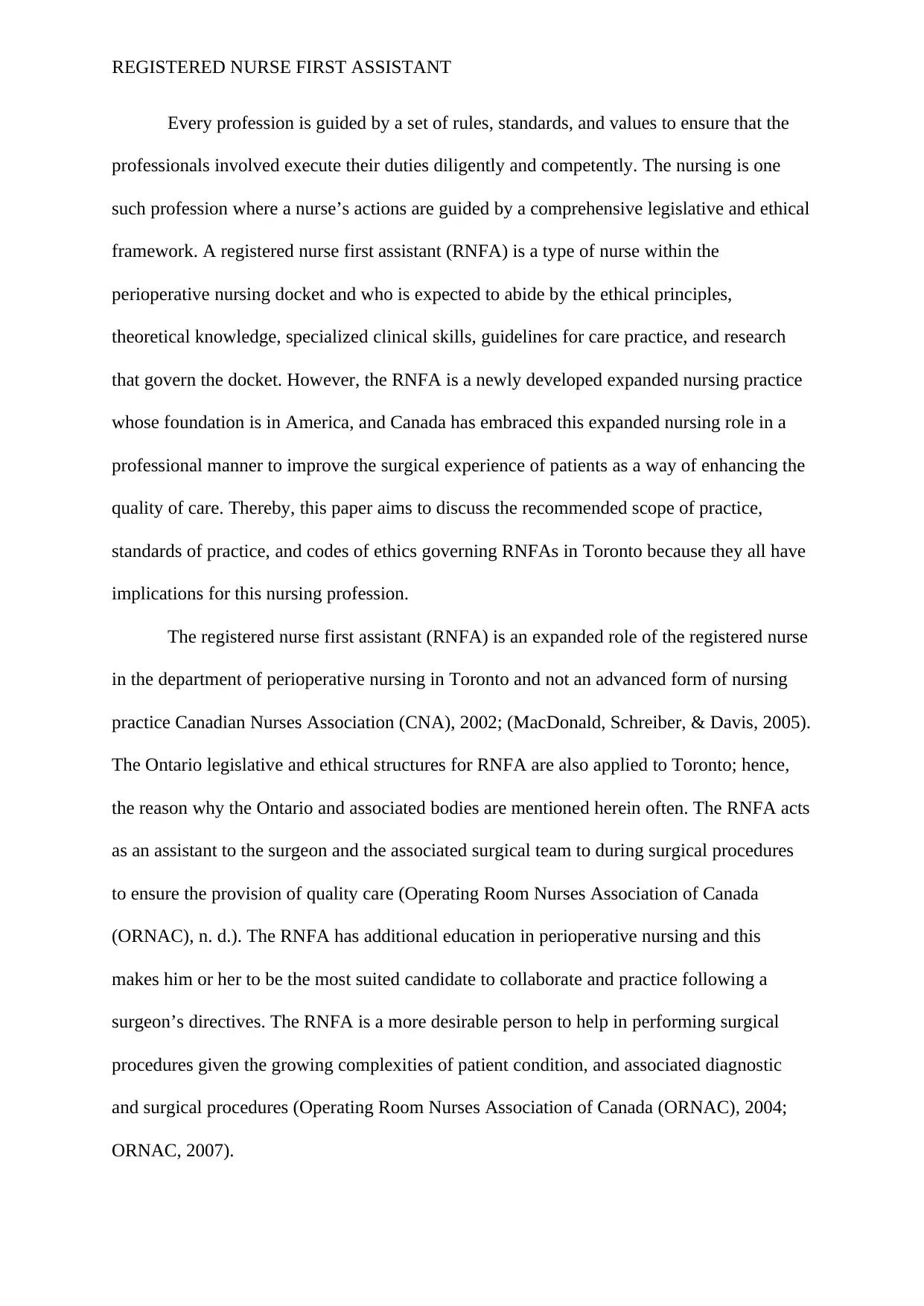
REGISTERED NURSE FIRST ASSISTANT
Every profession is guided by a set of rules, standards, and values to ensure that the
professionals involved execute their duties diligently and competently. The nursing is one
such profession where a nurse’s actions are guided by a comprehensive legislative and ethical
framework. A registered nurse first assistant (RNFA) is a type of nurse within the
perioperative nursing docket and who is expected to abide by the ethical principles,
theoretical knowledge, specialized clinical skills, guidelines for care practice, and research
that govern the docket. However, the RNFA is a newly developed expanded nursing practice
whose foundation is in America, and Canada has embraced this expanded nursing role in a
professional manner to improve the surgical experience of patients as a way of enhancing the
quality of care. Thereby, this paper aims to discuss the recommended scope of practice,
standards of practice, and codes of ethics governing RNFAs in Toronto because they all have
implications for this nursing profession.
The registered nurse first assistant (RNFA) is an expanded role of the registered nurse
in the department of perioperative nursing in Toronto and not an advanced form of nursing
practice Canadian Nurses Association (CNA), 2002; (MacDonald, Schreiber, & Davis, 2005).
The Ontario legislative and ethical structures for RNFA are also applied to Toronto; hence,
the reason why the Ontario and associated bodies are mentioned herein often. The RNFA acts
as an assistant to the surgeon and the associated surgical team to during surgical procedures
to ensure the provision of quality care (Operating Room Nurses Association of Canada
(ORNAC), n. d.). The RNFA has additional education in perioperative nursing and this
makes him or her to be the most suited candidate to collaborate and practice following a
surgeon’s directives. The RNFA is a more desirable person to help in performing surgical
procedures given the growing complexities of patient condition, and associated diagnostic
and surgical procedures (Operating Room Nurses Association of Canada (ORNAC), 2004;
ORNAC, 2007).
Every profession is guided by a set of rules, standards, and values to ensure that the
professionals involved execute their duties diligently and competently. The nursing is one
such profession where a nurse’s actions are guided by a comprehensive legislative and ethical
framework. A registered nurse first assistant (RNFA) is a type of nurse within the
perioperative nursing docket and who is expected to abide by the ethical principles,
theoretical knowledge, specialized clinical skills, guidelines for care practice, and research
that govern the docket. However, the RNFA is a newly developed expanded nursing practice
whose foundation is in America, and Canada has embraced this expanded nursing role in a
professional manner to improve the surgical experience of patients as a way of enhancing the
quality of care. Thereby, this paper aims to discuss the recommended scope of practice,
standards of practice, and codes of ethics governing RNFAs in Toronto because they all have
implications for this nursing profession.
The registered nurse first assistant (RNFA) is an expanded role of the registered nurse
in the department of perioperative nursing in Toronto and not an advanced form of nursing
practice Canadian Nurses Association (CNA), 2002; (MacDonald, Schreiber, & Davis, 2005).
The Ontario legislative and ethical structures for RNFA are also applied to Toronto; hence,
the reason why the Ontario and associated bodies are mentioned herein often. The RNFA acts
as an assistant to the surgeon and the associated surgical team to during surgical procedures
to ensure the provision of quality care (Operating Room Nurses Association of Canada
(ORNAC), n. d.). The RNFA has additional education in perioperative nursing and this
makes him or her to be the most suited candidate to collaborate and practice following a
surgeon’s directives. The RNFA is a more desirable person to help in performing surgical
procedures given the growing complexities of patient condition, and associated diagnostic
and surgical procedures (Operating Room Nurses Association of Canada (ORNAC), 2004;
ORNAC, 2007).
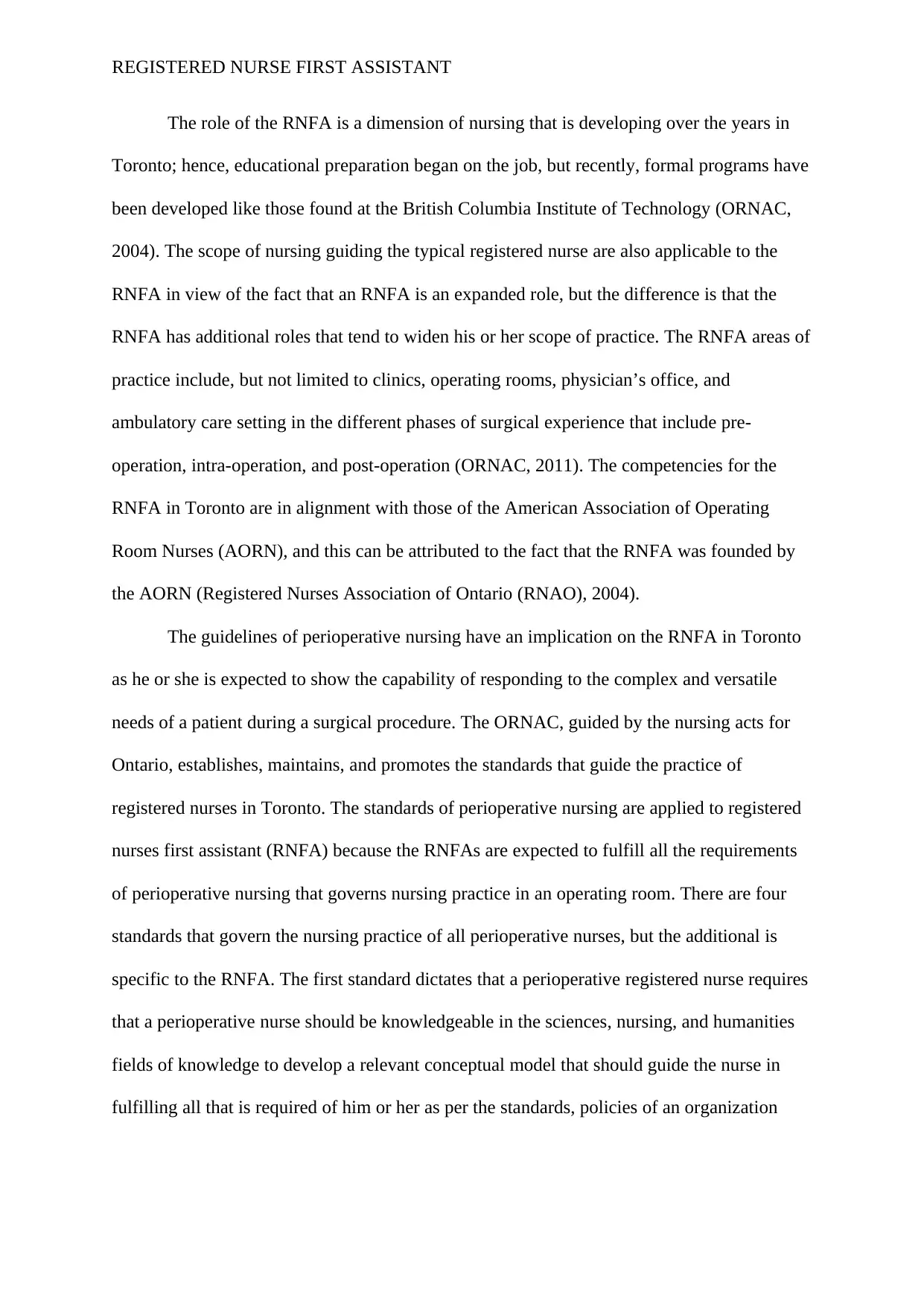
REGISTERED NURSE FIRST ASSISTANT
The role of the RNFA is a dimension of nursing that is developing over the years in
Toronto; hence, educational preparation began on the job, but recently, formal programs have
been developed like those found at the British Columbia Institute of Technology (ORNAC,
2004). The scope of nursing guiding the typical registered nurse are also applicable to the
RNFA in view of the fact that an RNFA is an expanded role, but the difference is that the
RNFA has additional roles that tend to widen his or her scope of practice. The RNFA areas of
practice include, but not limited to clinics, operating rooms, physician’s office, and
ambulatory care setting in the different phases of surgical experience that include pre-
operation, intra-operation, and post-operation (ORNAC, 2011). The competencies for the
RNFA in Toronto are in alignment with those of the American Association of Operating
Room Nurses (AORN), and this can be attributed to the fact that the RNFA was founded by
the AORN (Registered Nurses Association of Ontario (RNAO), 2004).
The guidelines of perioperative nursing have an implication on the RNFA in Toronto
as he or she is expected to show the capability of responding to the complex and versatile
needs of a patient during a surgical procedure. The ORNAC, guided by the nursing acts for
Ontario, establishes, maintains, and promotes the standards that guide the practice of
registered nurses in Toronto. The standards of perioperative nursing are applied to registered
nurses first assistant (RNFA) because the RNFAs are expected to fulfill all the requirements
of perioperative nursing that governs nursing practice in an operating room. There are four
standards that govern the nursing practice of all perioperative nurses, but the additional is
specific to the RNFA. The first standard dictates that a perioperative registered nurse requires
that a perioperative nurse should be knowledgeable in the sciences, nursing, and humanities
fields of knowledge to develop a relevant conceptual model that should guide the nurse in
fulfilling all that is required of him or her as per the standards, policies of an organization
The role of the RNFA is a dimension of nursing that is developing over the years in
Toronto; hence, educational preparation began on the job, but recently, formal programs have
been developed like those found at the British Columbia Institute of Technology (ORNAC,
2004). The scope of nursing guiding the typical registered nurse are also applicable to the
RNFA in view of the fact that an RNFA is an expanded role, but the difference is that the
RNFA has additional roles that tend to widen his or her scope of practice. The RNFA areas of
practice include, but not limited to clinics, operating rooms, physician’s office, and
ambulatory care setting in the different phases of surgical experience that include pre-
operation, intra-operation, and post-operation (ORNAC, 2011). The competencies for the
RNFA in Toronto are in alignment with those of the American Association of Operating
Room Nurses (AORN), and this can be attributed to the fact that the RNFA was founded by
the AORN (Registered Nurses Association of Ontario (RNAO), 2004).
The guidelines of perioperative nursing have an implication on the RNFA in Toronto
as he or she is expected to show the capability of responding to the complex and versatile
needs of a patient during a surgical procedure. The ORNAC, guided by the nursing acts for
Ontario, establishes, maintains, and promotes the standards that guide the practice of
registered nurses in Toronto. The standards of perioperative nursing are applied to registered
nurses first assistant (RNFA) because the RNFAs are expected to fulfill all the requirements
of perioperative nursing that governs nursing practice in an operating room. There are four
standards that govern the nursing practice of all perioperative nurses, but the additional is
specific to the RNFA. The first standard dictates that a perioperative registered nurse requires
that a perioperative nurse should be knowledgeable in the sciences, nursing, and humanities
fields of knowledge to develop a relevant conceptual model that should guide the nurse in
fulfilling all that is required of him or her as per the standards, policies of an organization
⊘ This is a preview!⊘
Do you want full access?
Subscribe today to unlock all pages.

Trusted by 1+ million students worldwide
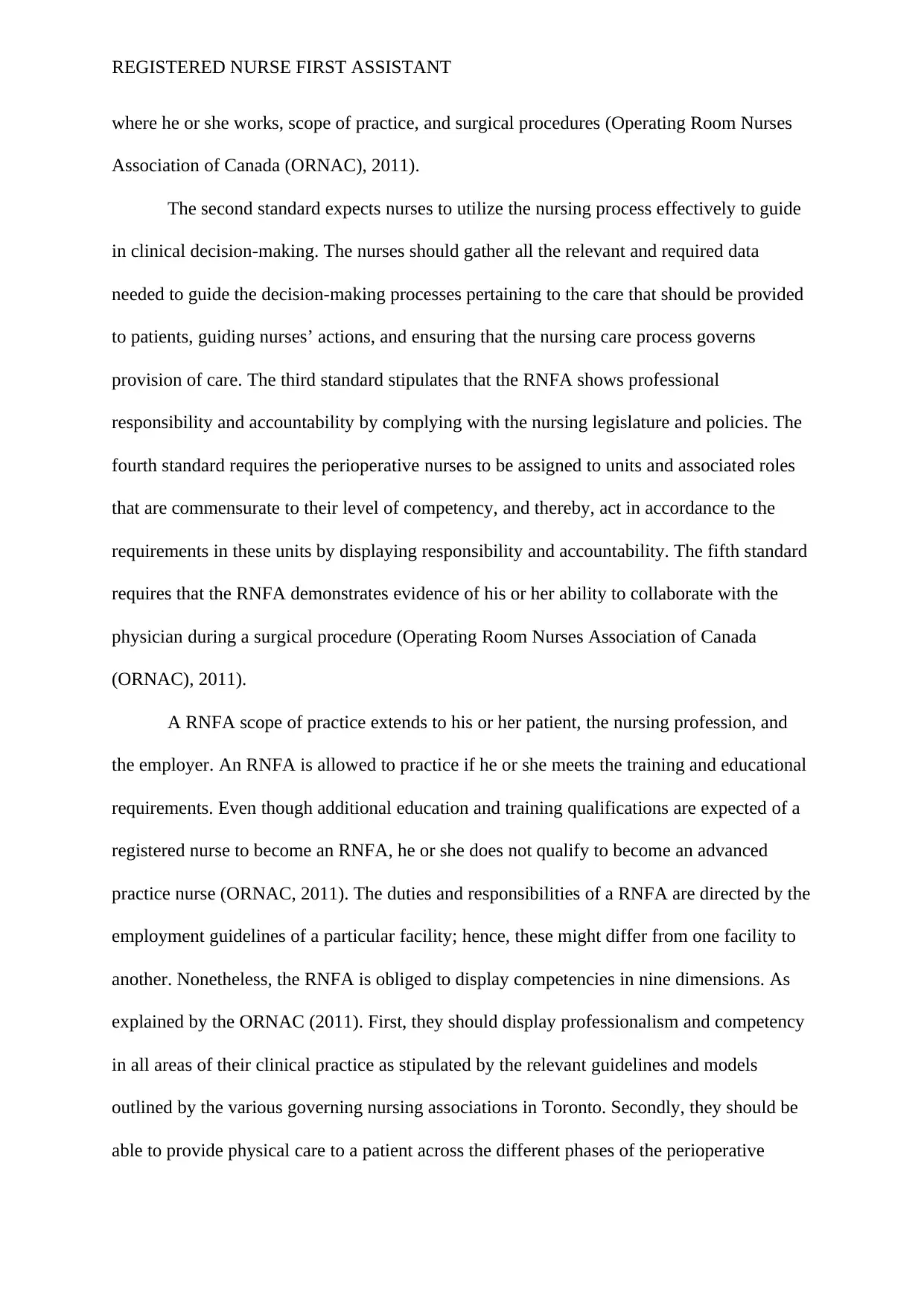
REGISTERED NURSE FIRST ASSISTANT
where he or she works, scope of practice, and surgical procedures (Operating Room Nurses
Association of Canada (ORNAC), 2011).
The second standard expects nurses to utilize the nursing process effectively to guide
in clinical decision-making. The nurses should gather all the relevant and required data
needed to guide the decision-making processes pertaining to the care that should be provided
to patients, guiding nurses’ actions, and ensuring that the nursing care process governs
provision of care. The third standard stipulates that the RNFA shows professional
responsibility and accountability by complying with the nursing legislature and policies. The
fourth standard requires the perioperative nurses to be assigned to units and associated roles
that are commensurate to their level of competency, and thereby, act in accordance to the
requirements in these units by displaying responsibility and accountability. The fifth standard
requires that the RNFA demonstrates evidence of his or her ability to collaborate with the
physician during a surgical procedure (Operating Room Nurses Association of Canada
(ORNAC), 2011).
A RNFA scope of practice extends to his or her patient, the nursing profession, and
the employer. An RNFA is allowed to practice if he or she meets the training and educational
requirements. Even though additional education and training qualifications are expected of a
registered nurse to become an RNFA, he or she does not qualify to become an advanced
practice nurse (ORNAC, 2011). The duties and responsibilities of a RNFA are directed by the
employment guidelines of a particular facility; hence, these might differ from one facility to
another. Nonetheless, the RNFA is obliged to display competencies in nine dimensions. As
explained by the ORNAC (2011). First, they should display professionalism and competency
in all areas of their clinical practice as stipulated by the relevant guidelines and models
outlined by the various governing nursing associations in Toronto. Secondly, they should be
able to provide physical care to a patient across the different phases of the perioperative
where he or she works, scope of practice, and surgical procedures (Operating Room Nurses
Association of Canada (ORNAC), 2011).
The second standard expects nurses to utilize the nursing process effectively to guide
in clinical decision-making. The nurses should gather all the relevant and required data
needed to guide the decision-making processes pertaining to the care that should be provided
to patients, guiding nurses’ actions, and ensuring that the nursing care process governs
provision of care. The third standard stipulates that the RNFA shows professional
responsibility and accountability by complying with the nursing legislature and policies. The
fourth standard requires the perioperative nurses to be assigned to units and associated roles
that are commensurate to their level of competency, and thereby, act in accordance to the
requirements in these units by displaying responsibility and accountability. The fifth standard
requires that the RNFA demonstrates evidence of his or her ability to collaborate with the
physician during a surgical procedure (Operating Room Nurses Association of Canada
(ORNAC), 2011).
A RNFA scope of practice extends to his or her patient, the nursing profession, and
the employer. An RNFA is allowed to practice if he or she meets the training and educational
requirements. Even though additional education and training qualifications are expected of a
registered nurse to become an RNFA, he or she does not qualify to become an advanced
practice nurse (ORNAC, 2011). The duties and responsibilities of a RNFA are directed by the
employment guidelines of a particular facility; hence, these might differ from one facility to
another. Nonetheless, the RNFA is obliged to display competencies in nine dimensions. As
explained by the ORNAC (2011). First, they should display professionalism and competency
in all areas of their clinical practice as stipulated by the relevant guidelines and models
outlined by the various governing nursing associations in Toronto. Secondly, they should be
able to provide physical care to a patient across the different phases of the perioperative
Paraphrase This Document
Need a fresh take? Get an instant paraphrase of this document with our AI Paraphraser
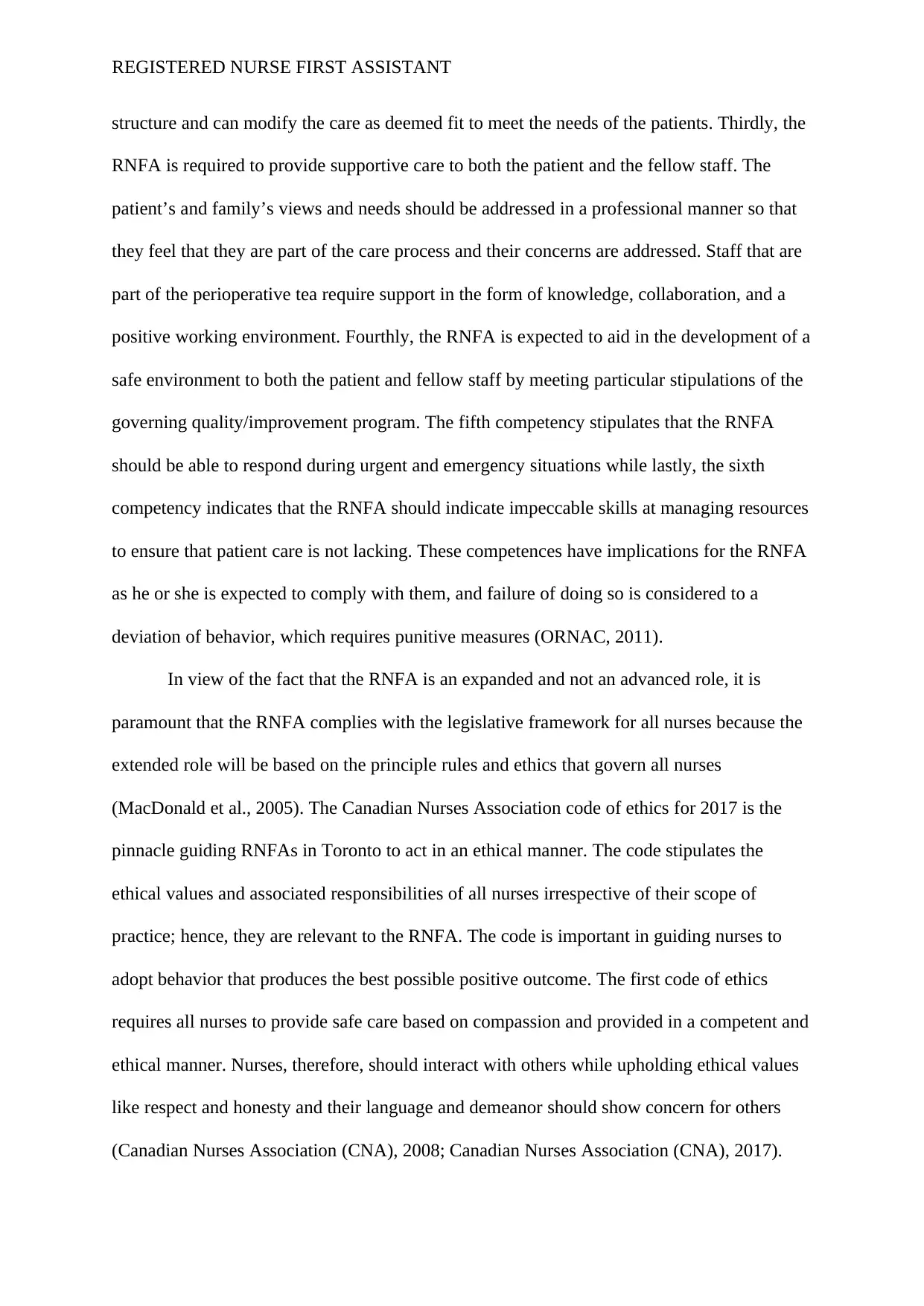
REGISTERED NURSE FIRST ASSISTANT
structure and can modify the care as deemed fit to meet the needs of the patients. Thirdly, the
RNFA is required to provide supportive care to both the patient and the fellow staff. The
patient’s and family’s views and needs should be addressed in a professional manner so that
they feel that they are part of the care process and their concerns are addressed. Staff that are
part of the perioperative tea require support in the form of knowledge, collaboration, and a
positive working environment. Fourthly, the RNFA is expected to aid in the development of a
safe environment to both the patient and fellow staff by meeting particular stipulations of the
governing quality/improvement program. The fifth competency stipulates that the RNFA
should be able to respond during urgent and emergency situations while lastly, the sixth
competency indicates that the RNFA should indicate impeccable skills at managing resources
to ensure that patient care is not lacking. These competences have implications for the RNFA
as he or she is expected to comply with them, and failure of doing so is considered to a
deviation of behavior, which requires punitive measures (ORNAC, 2011).
In view of the fact that the RNFA is an expanded and not an advanced role, it is
paramount that the RNFA complies with the legislative framework for all nurses because the
extended role will be based on the principle rules and ethics that govern all nurses
(MacDonald et al., 2005). The Canadian Nurses Association code of ethics for 2017 is the
pinnacle guiding RNFAs in Toronto to act in an ethical manner. The code stipulates the
ethical values and associated responsibilities of all nurses irrespective of their scope of
practice; hence, they are relevant to the RNFA. The code is important in guiding nurses to
adopt behavior that produces the best possible positive outcome. The first code of ethics
requires all nurses to provide safe care based on compassion and provided in a competent and
ethical manner. Nurses, therefore, should interact with others while upholding ethical values
like respect and honesty and their language and demeanor should show concern for others
(Canadian Nurses Association (CNA), 2008; Canadian Nurses Association (CNA), 2017).
structure and can modify the care as deemed fit to meet the needs of the patients. Thirdly, the
RNFA is required to provide supportive care to both the patient and the fellow staff. The
patient’s and family’s views and needs should be addressed in a professional manner so that
they feel that they are part of the care process and their concerns are addressed. Staff that are
part of the perioperative tea require support in the form of knowledge, collaboration, and a
positive working environment. Fourthly, the RNFA is expected to aid in the development of a
safe environment to both the patient and fellow staff by meeting particular stipulations of the
governing quality/improvement program. The fifth competency stipulates that the RNFA
should be able to respond during urgent and emergency situations while lastly, the sixth
competency indicates that the RNFA should indicate impeccable skills at managing resources
to ensure that patient care is not lacking. These competences have implications for the RNFA
as he or she is expected to comply with them, and failure of doing so is considered to a
deviation of behavior, which requires punitive measures (ORNAC, 2011).
In view of the fact that the RNFA is an expanded and not an advanced role, it is
paramount that the RNFA complies with the legislative framework for all nurses because the
extended role will be based on the principle rules and ethics that govern all nurses
(MacDonald et al., 2005). The Canadian Nurses Association code of ethics for 2017 is the
pinnacle guiding RNFAs in Toronto to act in an ethical manner. The code stipulates the
ethical values and associated responsibilities of all nurses irrespective of their scope of
practice; hence, they are relevant to the RNFA. The code is important in guiding nurses to
adopt behavior that produces the best possible positive outcome. The first code of ethics
requires all nurses to provide safe care based on compassion and provided in a competent and
ethical manner. Nurses, therefore, should interact with others while upholding ethical values
like respect and honesty and their language and demeanor should show concern for others
(Canadian Nurses Association (CNA), 2008; Canadian Nurses Association (CNA), 2017).
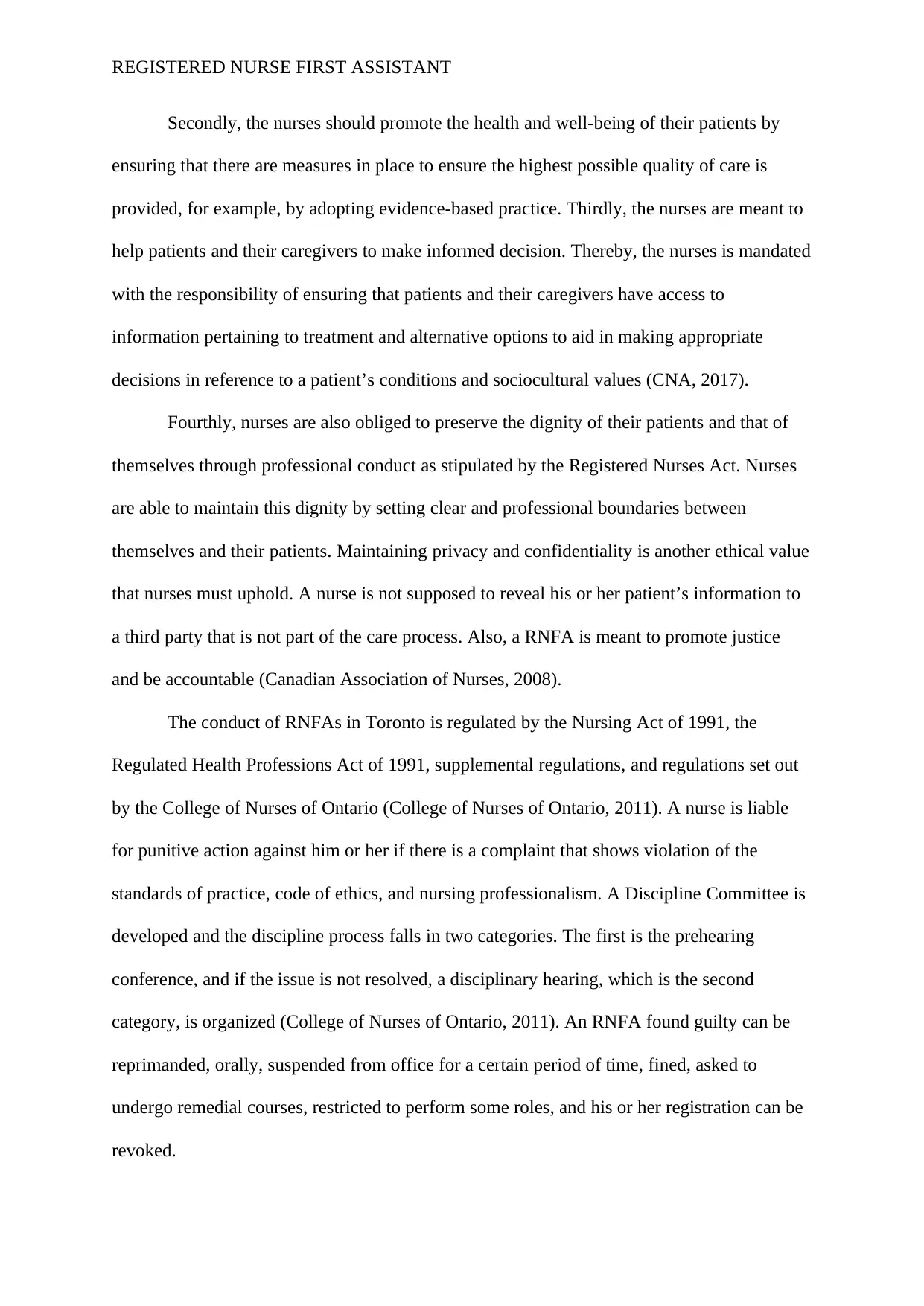
REGISTERED NURSE FIRST ASSISTANT
Secondly, the nurses should promote the health and well-being of their patients by
ensuring that there are measures in place to ensure the highest possible quality of care is
provided, for example, by adopting evidence-based practice. Thirdly, the nurses are meant to
help patients and their caregivers to make informed decision. Thereby, the nurses is mandated
with the responsibility of ensuring that patients and their caregivers have access to
information pertaining to treatment and alternative options to aid in making appropriate
decisions in reference to a patient’s conditions and sociocultural values (CNA, 2017).
Fourthly, nurses are also obliged to preserve the dignity of their patients and that of
themselves through professional conduct as stipulated by the Registered Nurses Act. Nurses
are able to maintain this dignity by setting clear and professional boundaries between
themselves and their patients. Maintaining privacy and confidentiality is another ethical value
that nurses must uphold. A nurse is not supposed to reveal his or her patient’s information to
a third party that is not part of the care process. Also, a RNFA is meant to promote justice
and be accountable (Canadian Association of Nurses, 2008).
The conduct of RNFAs in Toronto is regulated by the Nursing Act of 1991, the
Regulated Health Professions Act of 1991, supplemental regulations, and regulations set out
by the College of Nurses of Ontario (College of Nurses of Ontario, 2011). A nurse is liable
for punitive action against him or her if there is a complaint that shows violation of the
standards of practice, code of ethics, and nursing professionalism. A Discipline Committee is
developed and the discipline process falls in two categories. The first is the prehearing
conference, and if the issue is not resolved, a disciplinary hearing, which is the second
category, is organized (College of Nurses of Ontario, 2011). An RNFA found guilty can be
reprimanded, orally, suspended from office for a certain period of time, fined, asked to
undergo remedial courses, restricted to perform some roles, and his or her registration can be
revoked.
Secondly, the nurses should promote the health and well-being of their patients by
ensuring that there are measures in place to ensure the highest possible quality of care is
provided, for example, by adopting evidence-based practice. Thirdly, the nurses are meant to
help patients and their caregivers to make informed decision. Thereby, the nurses is mandated
with the responsibility of ensuring that patients and their caregivers have access to
information pertaining to treatment and alternative options to aid in making appropriate
decisions in reference to a patient’s conditions and sociocultural values (CNA, 2017).
Fourthly, nurses are also obliged to preserve the dignity of their patients and that of
themselves through professional conduct as stipulated by the Registered Nurses Act. Nurses
are able to maintain this dignity by setting clear and professional boundaries between
themselves and their patients. Maintaining privacy and confidentiality is another ethical value
that nurses must uphold. A nurse is not supposed to reveal his or her patient’s information to
a third party that is not part of the care process. Also, a RNFA is meant to promote justice
and be accountable (Canadian Association of Nurses, 2008).
The conduct of RNFAs in Toronto is regulated by the Nursing Act of 1991, the
Regulated Health Professions Act of 1991, supplemental regulations, and regulations set out
by the College of Nurses of Ontario (College of Nurses of Ontario, 2011). A nurse is liable
for punitive action against him or her if there is a complaint that shows violation of the
standards of practice, code of ethics, and nursing professionalism. A Discipline Committee is
developed and the discipline process falls in two categories. The first is the prehearing
conference, and if the issue is not resolved, a disciplinary hearing, which is the second
category, is organized (College of Nurses of Ontario, 2011). An RNFA found guilty can be
reprimanded, orally, suspended from office for a certain period of time, fined, asked to
undergo remedial courses, restricted to perform some roles, and his or her registration can be
revoked.
⊘ This is a preview!⊘
Do you want full access?
Subscribe today to unlock all pages.

Trusted by 1+ million students worldwide
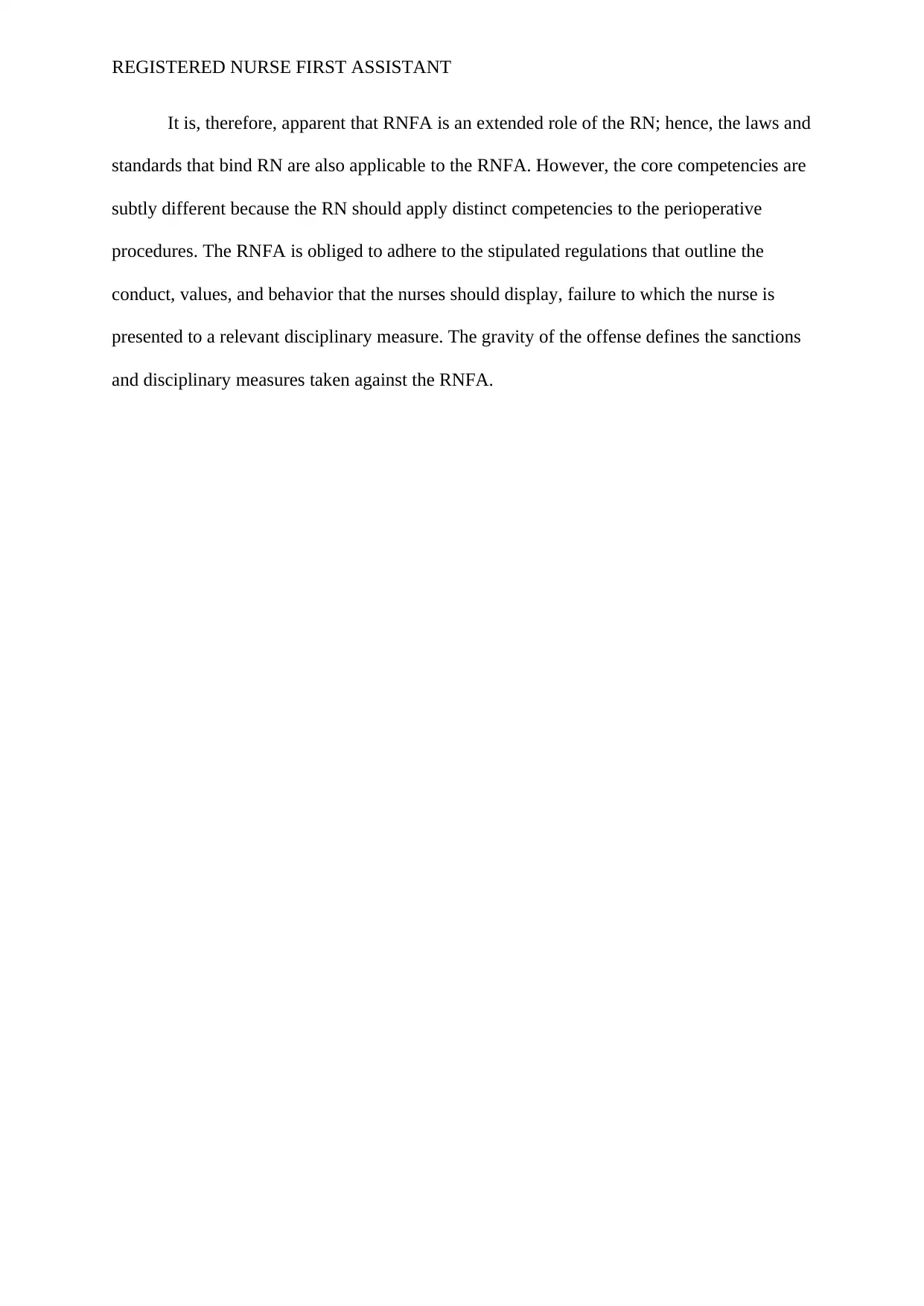
REGISTERED NURSE FIRST ASSISTANT
It is, therefore, apparent that RNFA is an extended role of the RN; hence, the laws and
standards that bind RN are also applicable to the RNFA. However, the core competencies are
subtly different because the RN should apply distinct competencies to the perioperative
procedures. The RNFA is obliged to adhere to the stipulated regulations that outline the
conduct, values, and behavior that the nurses should display, failure to which the nurse is
presented to a relevant disciplinary measure. The gravity of the offense defines the sanctions
and disciplinary measures taken against the RNFA.
It is, therefore, apparent that RNFA is an extended role of the RN; hence, the laws and
standards that bind RN are also applicable to the RNFA. However, the core competencies are
subtly different because the RN should apply distinct competencies to the perioperative
procedures. The RNFA is obliged to adhere to the stipulated regulations that outline the
conduct, values, and behavior that the nurses should display, failure to which the nurse is
presented to a relevant disciplinary measure. The gravity of the offense defines the sanctions
and disciplinary measures taken against the RNFA.
Paraphrase This Document
Need a fresh take? Get an instant paraphrase of this document with our AI Paraphraser
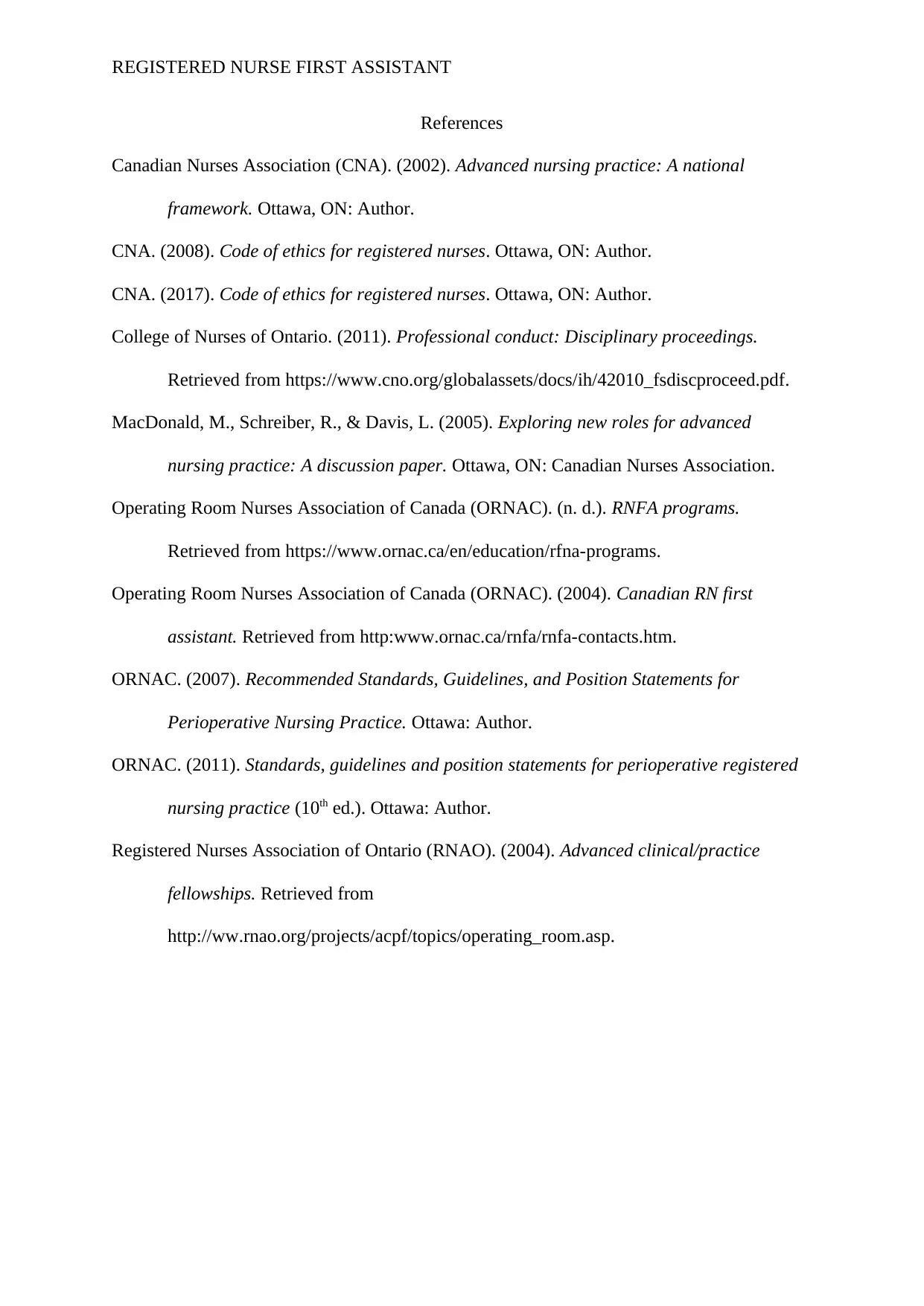
REGISTERED NURSE FIRST ASSISTANT
References
Canadian Nurses Association (CNA). (2002). Advanced nursing practice: A national
framework. Ottawa, ON: Author.
CNA. (2008). Code of ethics for registered nurses. Ottawa, ON: Author.
CNA. (2017). Code of ethics for registered nurses. Ottawa, ON: Author.
College of Nurses of Ontario. (2011). Professional conduct: Disciplinary proceedings.
Retrieved from https://www.cno.org/globalassets/docs/ih/42010_fsdiscproceed.pdf.
MacDonald, M., Schreiber, R., & Davis, L. (2005). Exploring new roles for advanced
nursing practice: A discussion paper. Ottawa, ON: Canadian Nurses Association.
Operating Room Nurses Association of Canada (ORNAC). (n. d.). RNFA programs.
Retrieved from https://www.ornac.ca/en/education/rfna-programs.
Operating Room Nurses Association of Canada (ORNAC). (2004). Canadian RN first
assistant. Retrieved from http:www.ornac.ca/rnfa/rnfa-contacts.htm.
ORNAC. (2007). Recommended Standards, Guidelines, and Position Statements for
Perioperative Nursing Practice. Ottawa: Author.
ORNAC. (2011). Standards, guidelines and position statements for perioperative registered
nursing practice (10th ed.). Ottawa: Author.
Registered Nurses Association of Ontario (RNAO). (2004). Advanced clinical/practice
fellowships. Retrieved from
http://ww.rnao.org/projects/acpf/topics/operating_room.asp.
References
Canadian Nurses Association (CNA). (2002). Advanced nursing practice: A national
framework. Ottawa, ON: Author.
CNA. (2008). Code of ethics for registered nurses. Ottawa, ON: Author.
CNA. (2017). Code of ethics for registered nurses. Ottawa, ON: Author.
College of Nurses of Ontario. (2011). Professional conduct: Disciplinary proceedings.
Retrieved from https://www.cno.org/globalassets/docs/ih/42010_fsdiscproceed.pdf.
MacDonald, M., Schreiber, R., & Davis, L. (2005). Exploring new roles for advanced
nursing practice: A discussion paper. Ottawa, ON: Canadian Nurses Association.
Operating Room Nurses Association of Canada (ORNAC). (n. d.). RNFA programs.
Retrieved from https://www.ornac.ca/en/education/rfna-programs.
Operating Room Nurses Association of Canada (ORNAC). (2004). Canadian RN first
assistant. Retrieved from http:www.ornac.ca/rnfa/rnfa-contacts.htm.
ORNAC. (2007). Recommended Standards, Guidelines, and Position Statements for
Perioperative Nursing Practice. Ottawa: Author.
ORNAC. (2011). Standards, guidelines and position statements for perioperative registered
nursing practice (10th ed.). Ottawa: Author.
Registered Nurses Association of Ontario (RNAO). (2004). Advanced clinical/practice
fellowships. Retrieved from
http://ww.rnao.org/projects/acpf/topics/operating_room.asp.
1 out of 8
Related Documents
Your All-in-One AI-Powered Toolkit for Academic Success.
+13062052269
info@desklib.com
Available 24*7 on WhatsApp / Email
![[object Object]](/_next/static/media/star-bottom.7253800d.svg)
Unlock your academic potential
Copyright © 2020–2026 A2Z Services. All Rights Reserved. Developed and managed by ZUCOL.





